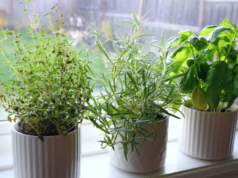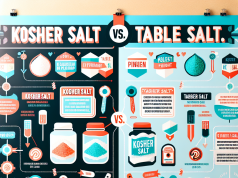Contents
What are the health benefits of using herbs in cooking?
Using herbs in cooking can provide a host of health benefits. Here are some of the benefits of using herbs in cooking:
- Adding flavor without adding calories: Herbs can add a lot of flavor to dishes without the need for extra salt or fat, making them a great option for those looking to lose weight or maintain a healthy diet.
- Providing antioxidants: Many herbs are rich in antioxidants, which can help protect against cell damage and disease.
- Reducing inflammation: Some herbs, like ginger and turmeric, have anti-inflammatory properties that can help reduce inflammation in the body.
- Supporting digestion: Many herbs, like peppermint and fennel, have digestive properties that can help soothe an upset stomach and support healthy digestion.
- Boosting immunity: Some herbs, like garlic and oregano, are known for their immune-boosting properties and can help ward off illness.
Incorporating herbs into your cooking is an easy and delicious way to add some health benefits to your diet. Whether you’re using fresh or dried herbs, there are plenty of options to choose from, and the flavor combinations are nearly endless. So next time you’re in the kitchen, try adding some herbs to your favorite dish and enjoy the health benefits they provide.
What are the Health Benefits of Using Herbs in Cooking?
Introduction
Herbs and spices have been used in cooking since ancient times. Apart from adding flavor and aroma to your cooking, herbs offer numerous health benefits. It is vital to know the benefits of different herbs to ensure you include them in your meals regularly.
Health Benefits of Herbs
- Reduce inflammation: Herbs like ginger and turmeric contain anti-inflammatory properties that help to reduce inflammation in the body. Including them in your diet can help to manage conditions like arthritis and inflammatory bowel disease.
- Boost immunity: Herbs like thyme, oregano, and rosemary have antibacterial properties that help to boost your immunity. They help protect your body from harmful bacteria that can cause illnesses like infections and common colds.
- Promote Digestion: Mint, coriander, and fennel are some of the herbs that help promote digestion. They help to reduce bloating and improve digestion of food, ensuring you don’t suffer indigestion or stomach upsets.
- Manage blood sugar levels: Herbs like cinnamon and fenugreek are known to help manage blood sugar levels. Including them in your diet can help manage diabetes and improve insulin sensitivity.
- Improve Brain Function: Herbs like sage and ginkgo have cognitive benefits. Studies suggest that including them in your diet can improve memory and concentration.
Conclusion
Including herbs in your diet can have numerous health benefits. While herbs are known for their health benefits, it is critical to take note of possible side effects of some herbs and make informed decisions. Before using herbs in your cooking, it is essential to check with a medical practitioner.
References
For more information on how to include herbs in your cooking and their health benefits, check out Healthline’s article on “10 Healthy Herbs and Spices”.
FAQs: What are the health benefits of using herbs in cooking?
1. Do herbs add any nutritional value to meals?
Yes, herbs are an excellent source of nutrition and can add vitamins, minerals, and antioxidants to your meals. For example, thyme is a good source of vitamin C, while oregano is rich in vitamin K.
2. Can herbs help reduce the risk of chronic diseases?
Yes, many herbs have anti-inflammatory and anti-bacterial properties that can help reduce the risk of chronic diseases such as heart disease, cancer, and Alzheimer’s disease.
3. Are herbs a healthy alternative to salt and sugar?
Yes, herbs are a healthy way to add flavor to your meals without using excess salt or sugar. This can help reduce the risk of high blood pressure, diabetes, and other health conditions.
4. Can herbs aid in digestion?
Yes, many herbs can aid in digestion by stimulating the production of digestive enzymes and soothing inflammation in the digestive tract. Some good options include ginger, peppermint, and fennel.
5. Are there any herbs that can boost the immune system?
Yes, several herbs such as echinacea, elderberry, and garlic can help boost the immune system and protect against infections.
6. Can herbs help improve mental health?
Yes, certain herbs like lavender, chamomile, and lemon balm have calming properties that can help reduce stress and anxiety, and promote relaxation.
7. Should herbs be used in moderation?
Yes, while herbs are generally safe and healthy, they should still be used in moderation. Some herbs can interfere with certain medications or cause adverse reactions if consumed in large quantities.
What Are Long Tail Keywords?
Long tail keywords are specific phrases that people use when searching for information online. Unlike short keywords, long tail keywords target a specific niche, and usually have less competition. For example, “herbs kitchen” is a long tail keyword that focuses on the use of herbs in cooking and food preparation.
Why Herbs Are Important in the Kitchen
Herbs are not only used to add flavor and aroma to dishes, but also have many health benefits. For instance, rosemary is rich in antioxidants, which help to protect the body against free radicals that damage cells and cause chronic diseases. Other herbs that are commonly used in the kitchen include:
- Basil
- Oregano
- Thyme
- Chives
- Mint
These herbs can help to improve digestion, boost the immune system, reduce inflammation, and enhance cognitive function.
How to Use Herbs in Your Cooking
Using herbs in your cooking is easy, and can help to add depth and complexity to your dishes. Here are some tips:
- Start with fresh herbs. Dried herbs can be used in a pinch, but fresh herbs are more flavorful and have a better aroma.
- Use the right amount. Too much or too little herbs can affect the taste of your dish. A general rule of thumb is to use 1 tablespoon of fresh herbs for every 4 servings.
- Pair flavors wisely. Some herbs go well together, while others clash. For example, basil and tomato are a classic pairing, while basil and mint might overwhelm each other.
Additional Resources
To learn more about herbs and their many benefits, check out the Herbs page on Wikipedia.
Health Benefits of Using Herbs in Cooking
- Herbs can add flavor and aroma to dishes, making them more enjoyable to eat.
- Herbs may help kill bacteria and prevent foodborne illnesses.
- Some herbs contain antioxidants, which can protect against cellular damage and reduce the risk of chronic diseases.
- Other herbs, such as ginger, can aid digestion and help relieve nausea or other stomach discomfort.
- Using herbs instead of salt or other high-sodium ingredients may help lower blood pressure and reduce the risk of heart disease.
- Certain herbs, such as mint or chamomile, may help promote relaxation and reduce stress.
Category – Pepper, Salt and Herbs








































